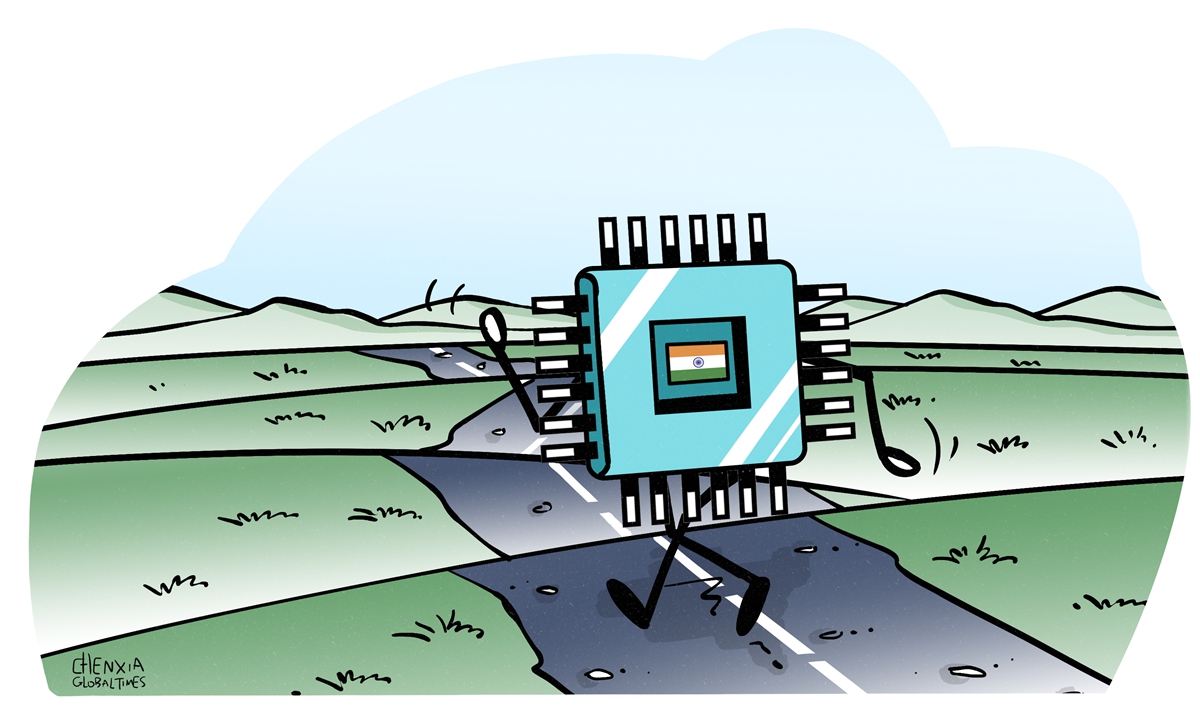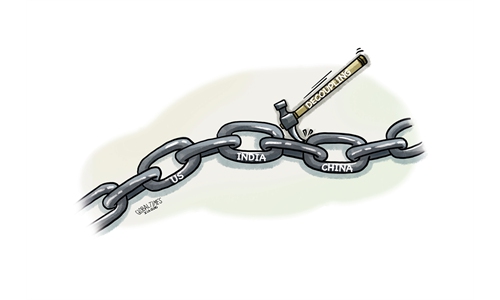
Illustration: Chen Xia/Global Times
India will likely break ground on its first semiconductor assembly plant next month. It is with a little surprise that US semiconductor company Micron Technology has become the protagonist of the story. India has long been ambitious about becoming a global semiconductor manufacturing hub. However, will its chip ambition be utilized as a tool for US companies to explore the Indian market?Ashwini Vaishnaw, India's minister of electronics and information technology, said Micron, which is setting up a chip assembly and test facility in Gujarat, would start construction in August on the $2.75 billion project, the Financial Times reported on Wednesday. With the project, India will begin producing the country's first domestically manufactured microchips by the end of 2024, the report said.
After years of effort, India's semiconductor manufacturing sector still remains underdeveloped due to disadvantages including backward infrastructure construction, inefficient supply chains and lack of a pool of skilled manpower. The country approved a $10 billion incentive plan in December 2021 to build semiconductor manufacturing ecosystem. But, an initial effort launched last year only attracted three applicants - all of which have made little progress so far, according to media reports.
Currently, the South Asian country is desperately in need of one example to show that it is able to achieve its semiconductor manufacturing objectives, and that's where the Micron project comes in. However, one thing is clear: If the India government cannot help the economy upgrade its domestic manufacturing by boosting innovation, improving infrastructure and reducing production costs, then the country will perhaps find it impossible to realize its dream of semiconductor manufacturing.
Why did Micron announce its investment when other manufacturers were hesitant? It's not hard to see some unusual considerations may be involved in Micron 's superficial enthusiasm toward made-in-India chips, and such acts have perhaps more symbolic than practical meanings. To some extent, practical outcomes may not be the focus. Some Indian media reports said the US firm will benefit from India's government incentives, under which it will receive 50 percent of its total project cost as financial support from the central government, and 20 percent from the state of Gujarat. This means that even if the investment fails, the losses will mainly be borne by the Indian government.
In May, China released the results of its cybersecurity review of Micron, saying that the company didn't pass the review because it has severe cybersecurity problems that could pose significant security risks. Some experts said the ban on Micron products will impact the chipmaker's business, which counted hundreds of millions of dollars of sales on the Chinese market. After the hiccup in China, an urgent problem facing Micron at present is how to explore new markets. It's understandable the chipmaker may turn its eyes to India's semiconductor market.
India's semiconductor market will touch $64 billion by 2026, almost three times its 2019 size of $22.7 billion, with significant demand from sectors like consumer electronics, telecom and IT hardware, Indian news website the Business Standard reported in May, citing a report by Counterpoint Research and the India Electronics & Semiconductor Association (IESA). India is trying to make itself a global hub of electronic manufacturing, and in this process, the country's domestic electronics production has created a rapidly growing demand for semiconductor.
Regardless of whether or not Micron's plant will have good prospects, the company's efforts to produce India's first domestically manufactured microchips may help it gain a favorable position in India's fast-growing semiconductor market. But for India, Micron's project is perhaps a mere consolation prize, with media reports saying the project does not include Micron's most advanced technology.
India's semiconductor manufacturing ambitions should, more realistically, be implemented step by step with patience. Otherwise, without a solid industrial foundation and a competitive semiconductor supply chain, India's chip ambitions will perhaps eventually turn out to be a mirage the country creates for itself.
The author is a reporter with the Global Times. bizopinion@globaltimes.com.cn



